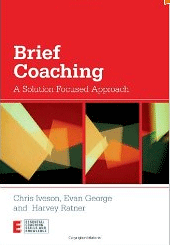“Brief Coaching: A Solution Focused Approach”

“Brief Coaching: A Solution Focused Approach”
By Chris Iveson, Evan George, and Harvey Ratner
Routledge
New York, N.Y., 2012
Lack of cited scientific research mars book
Reviewed by James K. Luiselli, Ed.D., ABPP, BCBA-D
The book’s premise is that, “Rather than trying to understand and fix problems, solution focused brief therapy works by exploring, in detail, a client’s preferred future, a description of a time when the problem is solved and then identifying whatever it is that the client is already doing that fits with the attaining of that future.” Furthermore, this orientation conforms more to a coaching model than a traditional therapy model. The theories and applications explained in the book emerged from a small group of mental health professionals who departed from the conventional psychotherapeutic paradigm of diagnose-formulate-treat.
We are informed that they sought to construct a problem-solving approach that moved away from a client’s deficits and towards life-fulfilling solutions. On a larger scale, the coaching model both borrowed from and contributed to the business world through managerial and leadership training.
What, then, is a solution focused approach? In the authors’ words, “The solution focused coach would rather be invisible than significant; someone who generates and manages a conversation in which the client hears his or hers own words either for the first time or with fresh ears. The end result should be that clients experience themselves charting and treading their own path unaided.” Additionally, “the coaching relationship is simply a business relationship” and “solution focused coaching and solution focused therapy are virtually indistinguishable.” I quote liberally here to convey the typical narrative in the book which, I suggest, is not easily accessible and difficult to translate into practice.
On a more positive note, the authors illustrate their approach through many coach-client dialogues that reveal common elements of solution focused coaching. Mainly, the coaching objectives are directing a client towards valued actions, accentuating positive objectives and promoting personal problem solving. For me, these characteristics resemble elements of cognitive-behavioral therapy, behavioral activation and functional analytic psychotherapy, although I doubt the authors would see it the same way.
Unfortunately, the book does not cite or describe any research that has examined the theoretical underpinnings or reported empirical outcome data from solution focused coaching. The references section in the book cites several texts by like-minded devotees (e.g., “Brief Coaching for Lasting Solutions”) but nothing I could find that meets the standards of scientific peer review. This concern is noteworthy in light of the authors’ contention that their model “has been developed with clients facing major life- and future-threatening problems such as suicidal depression, drug addiction, school exclusion, family breakdown and has been as successful as any other therapy model.”
What this book offers are some potentially fruitful ideas about conducting therapy, indeed the process of therapy itself. I also liked the emphasis on “client strengths, resources, competencies, capabilities and successes.” And yet, the authors essentially disregard the complexities of diagnostic formulation, comorbidity, risk assessment and similar practices. Their many proclamations of success also exceed the available evidence. It seems to me that the best audience for the book would be professionals who are coaching enthusiasts, acquainted with solution focused therapy and interested in non-familiar therapeutic procedures.
James K. Luiselli, Ed.D., ABPP, BCBA-D, is senior vice president, applied research, clinical training and peer review at the May Institute in Norwood, Mass.
Learn more about the book: Brief Coaching: A Solution Focused Approach (Essential Coaching Skills and Knowledge)
